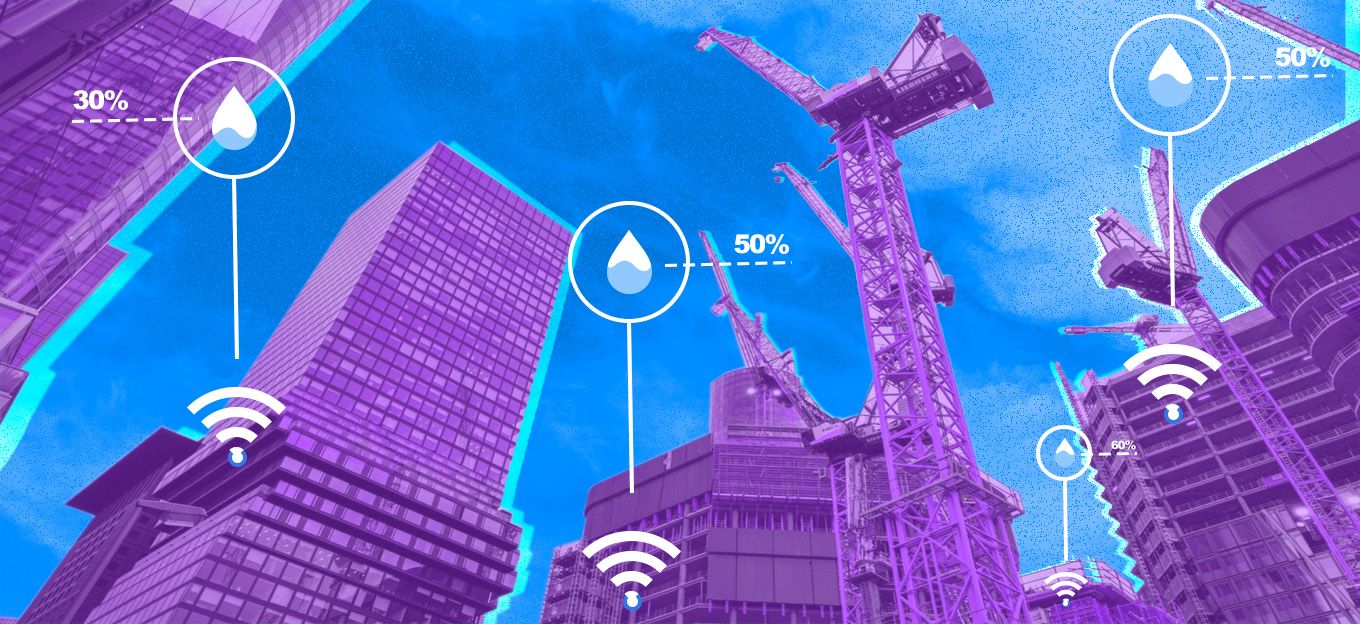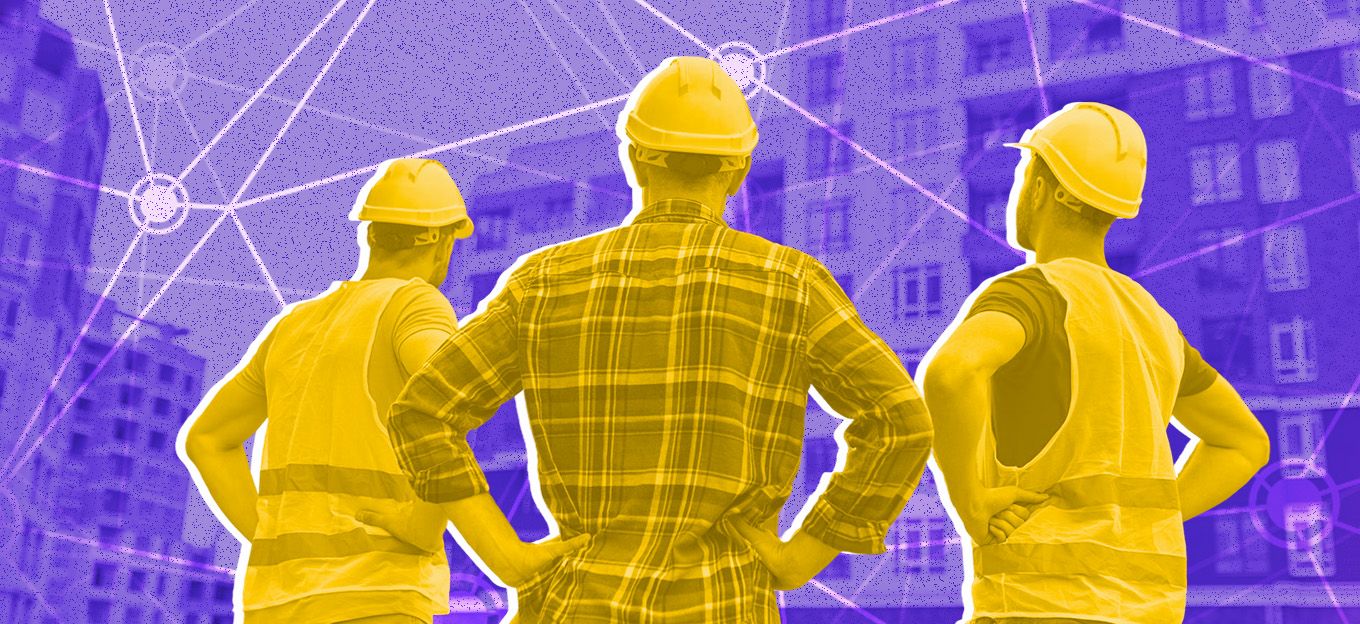The Impact of IoT on Construction Jobsites
The Impact of IoT on Construction Jobsites
- Last Updated: March 20, 2025
Sensera Systems
- Last Updated: March 20, 2025



Delivering on-budget and on-time projects is a primary goal for construction companies. Yet, the worker shortage and rising material costs make achieving this objective more challenging. Despite the industry’s historically slow technology adoption, more companies are turning to data-driven, IoT-enabled intelligence tools to help confront these challenges on construction job sites. That demand sparked an 85% growth in investments for the AEC tech industry between 2020 and 2022.
The industry has started to embrace the idea that better protecting people and mitigating risk, managing assets, and optimizing workflows require more urgent tech adoption. Let’s explore the impact IoT solutions can have when it comes to helping builders address the challenges in front of them and deliver superior project outcomes.
Making the Industry More Attractive with IoT-Enabled Safety Solutions
Safety risk is one of the top factors that deters people from construction jobs given the industry accounts for about 1 in 5 workplace deaths. To make matters worse, when construction teams are short-staffed, they are prone to additional risk.
While construction leaders agree safety is critical, it can also go overlooked amid the rigors of a workday. With so many different workers coming and going from each site, it's challenging to manage. Construction managers need to rely on their teams, partners, and third-party contractors to have high safety standards. IoT technologies can help mitigate this risk by giving managers real-time insight into the status of job sites.
Construction job site intelligence software built on IoT-enabled cameras gives safety managers, project managers, and company leadership always-on visibility into what’s happening across the site. Self-contained cameras are easy to deploy and operate and allow construction leaders to see what’s happening in real time from one URL, whether via a website browser or embedded within a comprehensive project management platform. These platforms can also let them access recordings so they can check on incidents, review practices, and mitigate potential risks.
Furthermore, wearable devices, such as smart watches, help monitor worker health. They send employees alerts if workers start to overexert themselves or if external conditions, like high heat, are too dangerous. Connecting this data to the company’s job site intelligence platform enhances management’s purview of the situation. They can validate what the data is showing, and then determine the appropriate course of action. For example, perhaps employees can use a machine more effectively to minimize physical strain. Or management can re-allocate responsibilities and adjust workflows as necessary.
By implementing IoT solutions to support site safety, construction companies can mitigate jobsite risk and make their companies more attractive to prospective employees.
Protecting Jobsites with IoT-Enabled Security Solutions
Construction theft has always been a challenge across the industry, resulting in losses of approximately $400 million to $1 billion each year. However, replacing stolen equipment has become significantly more expensive — the price of new equipment has increased by more than 20 percent since pre-pandemic times. The delays to a project to remediate or replace materials due to theft and vandalism can also be significant. It’s no surprise that the threat of vandalism, tampering, and theft are keeping construction managers on particularly high alert. And, most times, obtaining the right builder's risk insurance coverage requires implementing a comprehensive security plan. That’s where IoT technologies offer support.
Advancements in IoT technology have evolved construction jobsite cameras into site intelligence tools. They are purpose-built for site surveillance, and now come equipped with talk-down capabilities to help deter unauthorized visitors. The monitoring team can send real-time, personalized audio messages such as, “Step away from the excavator and leave the site” or, “You in the red shirt are trespassing; exit immediately.” This helps intimidate visitors and mitigates potential harm.
Enhancing Equipment Security
Fixing IoT-enabled sensors to construction equipment enables managers to monitor the location and status of tools via the job site intelligence platform. In the event of a security breach, they can quickly determine which equipment was compromised and issue an insurance claim – and validate this information with visual data from job site cameras. This documentation and validation not only helps managers oversee multiple sites at once: it speeds up time to resolution in the case of a security threat.
Looking ahead, aligning sensor technologies with visual intelligence speeds up the time it takes to get projects back on track following an incident. It can even help mitigate incidents happening. For example, a piece of equipment is flagged as having left the site. Using that timestamp and the 24/7 video feeds from a job site intelligence camera solutions, contractors can automatically find that moment in time and determine what happened. It can validate that the equipment was moved correctly or incorrectly, and, if stolen, be used as evidence to file a claim. It keeps eyes on movement in and around the job site, and flags relevant incidents when they require attention.
Driving More Efficient Project Outcomes with IoT
While IoT can help address some of the challenges that come with the worker shortage and rising material costs, it can also help construction companies achieve their primary goal of delivering efficient projects. U.S. contractors wasted upwards of $30 billion in 2022 as a result of labor inefficiencies. With so many moving parts on a job site, there are several factors that can hinder productivity. Implementing digital, IoT-enabled tools can give construction managers better visibility into activity across projects so they can make more informed decisions and optimize operations.
Project Outcomes in Action
For instance, site intelligence solutions that leverage IoT-enabled cameras help construction managers keep track of an entire portfolio of job sites so they can view progress in real time. They can easily see what’s working, what workflows are hindering productivity, and manage with a complete 360 view. Best of all, managers can prioritize their time, avoiding the need to spend travel time and fuel costs driving to every site. They can effectively check that work is being completed on time, on budget, and to the best quality standards. They can prioritize their workday as needed and be efficient with their time.
Similarly, leveraging sensors in construction machinery helps monitor the status of equipment. This way, teams can detect the need for repairs and resolve them before they result in significant downtime. Populating this data in their job site intelligence platform gives them visibility into the status of all repairs from one central place. They can even refer back to their camera feeds to see if a piece of equipment broke due to incorrect operation and arrange for more employee training if necessary.
IoT-enabled sensors can also help teams track equipment so they can efficiently locate the tools they need based on the 360-degree view provided by their job site intelligence platform. This way, they spend more time working toward project goals and less time searching the entire site for specific equipment.
An IoT-Enabled Construction Future
Between 2017 and 2022, the market for architecture, engineering, and construction tech tripled in value. While the construction industry is facing some challenges when it comes to a talent shortage and rising material prices, it is also poised for significant technological transformation. IoT solutions will play a key role in helping construction companies optimize productivity on job sites and deliver more efficient project outcomes.
The Most Comprehensive IoT Newsletter for Enterprises
Showcasing the highest-quality content, resources, news, and insights from the world of the Internet of Things. Subscribe to remain informed and up-to-date.
New Podcast Episode

IoT in 2026: Trends and Predictions
Related Articles



